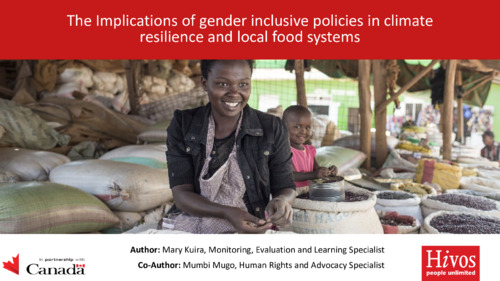The implications of gender inclusive policies in climate resilience and local food systems
Abstract
Climate change is already undermining food systems, contributing to a rise in global hunger and threatening the livelihoods of millions of farmers. Since women are more adversely affected by climate change due to their social and cultural roles, adaptive responses call for integration of gender inclusiveness in climate-resilient policies. Funded by the Global Affairs Canada through Seed Change, Hivos is implementing a six-year program (2021–27)—Rural Women Cultivating Change—aimed at enhancing gender equality and empowerment of rural women in Ethiopia, Tanzania and Kenya. With a focus on the intersection between women’s rights and climate adaptation in order to better support sustainable and equitable resource management, agricultural production and access to markets, the program took the initiative of mapping the gender policy issues in climate resilience and local food systems in four implementing counties in Kenya (Nakuru, Baringo, Kitui and Laikipia). The findings indicate that the policy development and implementation processes had not deliberately included women and youths during planning, communication and implementation, resulting in policies that are not adequately gender sensitive. The low level of awareness about the policies (40%) among the women farmers and public officers shows ineffective approaches to dissemination to local communities—resulting in poor accountability mechanisms from the policymakers. The program has already signed memoranda of understanding with the four county governments, who are in the process of reviewing the climate-resilient and food policies to ensure gender inclusiveness and streamlining the policy-development processes to ensure women’s representation.

